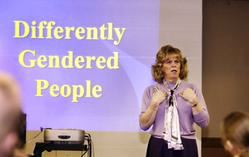Fargo Forum Newspaper
after Debra Davis's presentation at NDSU in February of 2004.


Speaker promotes transgender understanding
By Mike Nowatzki
mnowatzki@forumcomm.com
The Forum Newspaper- 02/25/2004

Photo by Bruce Crummy / The Forum
Debra Davis, executive director of the
Gender Education Center
in Maple Grove, Minn.,
speaks Tuesday at North Dakota State University in Fargo.
The retired media director changed genders at age 51 in 1998.
Debra Davis always knew she was different.
Growing up in Minneapolis as a boy named David Nielsen, Davis preferred playing with the girls in the backyard to roughhousing with the boys in the front yard.
As an adult with a wife and kids, Davis was a cross-dresser who hid the behavior from her family.
“I can tell you that all the boxes of tools in my garage didn't have tools,” she said.
In 1997, Davis decided to stop living a lie. She made headlines by transitioning "over a weekend" from man to woman while employed as media director at Southwest High School in Minneapolis.
Tuesday, she shared her story with about 65 North Dakota State University students and others at the Memorial Union, hoping to provide a better understanding of what it means to be transgender.
Transgender is a broad term that refers to men and women who dress and behave like the opposite sex, and who may or may not have had their bodies surgically altered. It includes all who cross-dress or otherwise transgress gender norms.
“We don't fit into a lot of comfortable, neat little boxes,” Davis said.
The 56-year-old has given more than 730 presentations nationwide as executive director of the nonprofit Gender Education Center. She also provides educational material through her Web site, www.debradavis.org.
A transgender person's gender identity doesn't determine their sexual orientation, Davis said. Although she considered herself a woman, she wasn't attracted to men, she said.
Minnesota is one of four states with anti-discrimination laws to protect transgender people. The Minnesota Human Rights Act defines transgender people as “having or being perceived as having a self-image or identity not traditionally associated with one’s biological maleness or femaleness.”
Still, acceptance in the workplace is a problem for transgender people, Davis said, adding she knows of no other schoolteacher who's come out since she did in 1998.
The majority of transgender people are “hugely, hugely closeted,” she said.
Seventeen percent of transgender people successfully commit suicide, while nearly 90 percent of transgender students report feeling unsafe, she said. Fifty percent of transsexuals -- those who have or want to physically alter their anatomy -- have tried to kill themselves at least once, she said.
Last year, 37 to 40 people were killed in the United States because they were transgender, she said.
“We're always concerned about violence,” she said.
In a recently published Campus Climate Survey, only five of the 1,625 NDSU students who responded to the survey reported being transgender. Four of the students said they'd personally experienced harassment.
It's difficult for NDSU students to gain a true understanding of what it means to be transgender, said Tracy Arntson, 29, clinic coordinator at the NDSU Family Therapy Center.
“I don't think you can, because you're not exposed,” she said.
Tegan Henke, a 24-year-old graduate student in NDSU's couples and family therapy program, said Davis was the first transgender person she's met.
“Her strength is amazing,” she said.
Readers can reach Forum reporter Mike Nowatzki at (701) 241-5528

 Return to Articles, Presentations and Addresses page
Return to Articles, Presentations and Addresses page
 Return to College Photo's page
Return to College Photo's page
 Return to GEC home page
Return to GEC home page